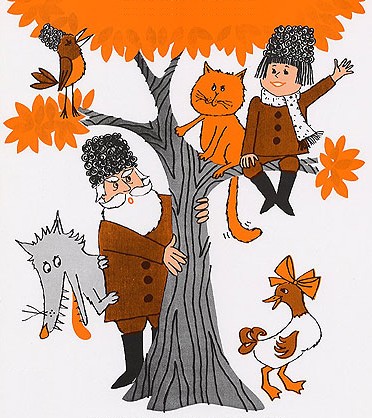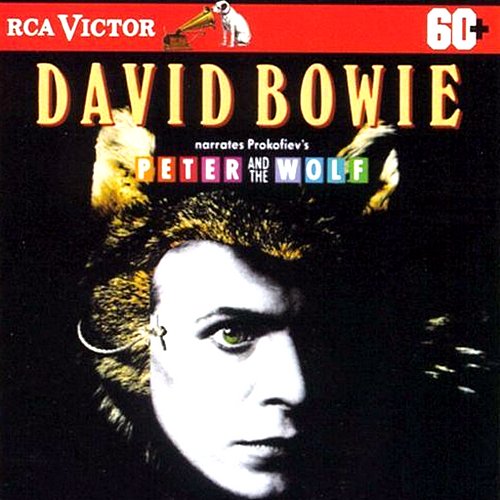"...for that which does not come from the heart will surely not reach the heart."
AUTHOR: Johann Joachim Quantz


MEANING OF THE QUOTE:
“Music without human compassion and soul is just a lot of sounds."
COMPOSER
PROKOFIEV
 |
| http://bethsmusicnotes.blogspot.com/2012/03/more-peter-and-wolf.html |
Peter and the Wolf Movie Presentation:
Introduction
Peter and the Wolf Live:
Musical Themes
Peter And The Wolf
Sterling Holloway, Narrator
https://www.youtube.com/watch?v=HvTnRFJuHG4
Prokofiev and Walt Disney
ARTICLE FROM:
Peter & the Wolf
Essay: Prokofiev's "Peter & the Wolf"
If Sergei Prokofiev had composed nothing except “Peter and the Wolf,” he would have left a sizable mark. The work has helped introduce generations of children to the instruments of the orchestra and the concept of telling a story through music, fulfilling the goal Prokofiev set for himself in 1936. Although this particular narrative, also written by the composer, isn’t entirely cheery — the wolf’s swallowing of an unfortunate duck comes to mind — the sonic side of things is so inventive and engaging that the whole thing seems somehow thoroughly uplifting. Even in the sometimes darker, moodier version of “Peter & the Wolf”
brilliantly directed by animator Suzie Templeton being shown on GREAT PERFORMANCES,
there is an affecting turn toward the light (moonlight, in this case) at the end. Since the score’s ingenious match of character to instrument enables listeners of practically any age to envision the scenes easily, the brief, original text gets the job done neatly. But chances are, Prokofiev would have loved the way Templeton opens up the story, providing such a rich world of imagery and action that no words are spoken at all, while the music is treated with total respect.
In 1935, in addition to working on his stunning ballet score “Romeo and Juliet,” Prokofiev wrote several short pieces for children, a genre that suddenly seemed to be in demand. Fortuitously, during this same period, the composer attended a couple of events at the Moscow Children’s Musical Theater, taking his own kids along. The director invited him to write something for the theater, and Prokofiev quickly accepted. “In the spring of 1936,” he recorded in his diary, “I started a symphonic tale for children titled ‘Peter and the Wolf,’ Op. 67, to a text of my own. [Prokofiev had first rejected a text prepared by a poet recommended by the theater director, on the grounds that it was clichéd.] Every character in the story had its own motif played each time by the same instrument. … Before each performance, the instruments were shown to the children and the themes played for them; during the performance, the children heard the themes repeated several times and learned to recognize the timbres of the different instruments. The text was read during the pauses in the music, which was disproportionately longer than the text — for me, the story was important only as a means of inducing the children to listen to the music.”
Clearly inspired by the concept, Prokofiev finished composing in one week, taking just another week to do the orchestration. A measure of his devotion to the project can be seen in the fact that he agreed to accept whatever fee the theater could afford.
 |
| Peter & the Wolf - written by Sergei Prokofiev Retold by Patricia Crampton Illustrated Josef Palecek (1987) http://myvintagebookcollectioninblogform.blogspot.co.uk/2012/05/ peter-and-wolf-illustrated-by-josef.html |
The scenario of “Peter and the Wolf” is straightforward. A boy (depicted by strings) wanders through nature, observing a duck (oboe), a bird (flute), and a cat (clarinet). The cat tries to catch the bird. Peter’s grandfather (bassoon) admonishes him for wandering in a place where a wolf might attack and makes him return home. From that safe place, sure enough, Peter soon sees a wolf (horns) arrive on the scene. The wolf wolfs down the duck and then threatens the bird and cat. Determined to thwart the aggressor, Peter sneaks back outside and manages to catch the animal, with the help of the bird and a rope. When hunters (lots of timpani and bass drum) arrive on the scene, anxious to kill the wolf, Peter urges them to let the animal be taken to a zoo instead. As they all head off in happy procession, the duck can be heard quacking inside the wolf’s stomach, “for, in his hurry, the wolf had swallowed her whole.”

As Harlow Robinson writes in his 1987 biography of Prokofiev, “If the story has a moral, it seems to be this: don’t be afraid to challenge established beliefs (Grandfather’s caution) or to take risks. It is Peter’s independence, shrewdness and courage that save the day; if he hadn’t disobeyed his grandfather by climbing over the wall, the wolf would never have been caught. Seen in this light, ‘Peter and the Wolf’ is a subtly subversive tract, encouraging children to rely on their wits and not on the greater experience (and inertia) of their elders.”

It’s entirely possible, of course, to view the piece as pure entertainment and music appreciation, devoid of any hidden message.
The first performance featured Prokofiev at the keyboard and was a hit with the young audience at the Children’s Theater. A formal, public performance a few days later “was rather poor and did not attract much attention,” the composer entered into his diary. But the fate of “Peter and the Wolf” quickly improved. Within a few weeks, yet another performance was given in Moscow, and this time, there was no mistaking the triumph. In short order, the work was charming audiences far beyond Soviet Russia. It clearly knew no geographic or demographic boundaries. And the educational element was grasped from the start; concerts for young people were not complete without it.

That Prokofiev should have created such a masterpiece isn’t at all surprising. Robinson explains it neatly: “Long after his own idyllic childhood, he continued to love children for their unfettered imagination, sense of play and inability to dissimulate. That he never forgot what it meant to be a child, and how children think, is evident in the playful but never condescending music he wrote for them, most of all the phenomenally successful ‘Peter and the Wolf,’ written when Prokofiev was a boy of forty-five.”

Over the decades, the work has been performed by virtually every orchestra and conductor and has also attracted an endless list of narrators, including an impressive number of A-listers from virtually every field, among them Sting,
Sting, Narrator
Sting, Narrator
(I could not locate the 3/3 video.)
David Bowie,
Eugene Ormandy, Conductor
David Bowie, Narrator (1978)
Eugene Ormandy, Conductor
David Bowie, Narrator (1978)
Eugene Ormandy, Conductor
David Bowie, Narrator (1978)
Eugene Ormandy, Conductor
David Bowie, Narrator (1978)
Patrick Stewart,
Carlos Carvajal's Ballet
Patrick Stewart, Narrator (2004)
Patrick Stewart, Narrator (2004)
John Gielgud,


Sophia Loren,
Sean Connery,
Boris Karloff,
Jack Lemmon,
William F. Buckley,
Captain Kangaroo,
and the inimitable Dame Edna Everage (a.k.a. Barry Humphries).
And, of course, there have been many comic takeoffs on the story as well,
including those by the likes of Weird Al Yankovic,
including those by the likes of Weird Al Yankovic,
http://www.metrolyrics.com/peter-and
-the-wolf-lyrics-weird-al-yankovic.html
Peter and the Wolf by Sergei Prokofiev performed by "Weird Al" Yankovic and Wendy Carlos (31:53)
-the-wolf-lyrics-weird-al-yankovic.html
Peter and the Wolf by Sergei Prokofiev performed by "Weird Al" Yankovic and Wendy Carlos (31:53)
P.D.Q. Bach (a.k.a. Peter Schickele),
and Allan Sherman.
Now comes Suzie Templeton’s provocative animated, wordless version, set in our own time and in a Russia that, on the surface, does not seem to have improved much from the bleakest Soviet days. But in that ominous world, the spirit of an inquisitive, sensitive, brave boy glows and grows as brightly as ever.
Referenced Source:
Prokofiev, Sergei. SOVIET DIARY 1927 AND OTHER WRITINGS. Trans. and ed. Oleg Prokofiev. Boston: Northeastern University Press, 1992.
Robinson, Harlow. SERGEI PROKOFIEV: A BIOGRAPHY. New York: Viking Penguin, 1987.
–Tim Smith
Bramwell Tovey Conductor and Narrator
Vancouver Symphony Orchestra
 |
| http://musicforhomeschoolers- loretta.blogspot.com |
Leonard Bernstein Conductor and Narrator
New York Philharmonic Orchestra
 |
| http://musicforhomeschoolers- loretta.blogspot.com |
Herbert von Karajan, Conductor
Peter Ustinov, Narrator (1960)
 |
| http://musicforhomeschoolers- loretta.blogspot.com |
 |
| http://musicforhomeschoolers- loretta.blogspot.com |
 |
| http://www.ellenweinstein.com/Nashville-Symphony |
 |
| http://musicforhomeschoolers- loretta.blogspot.com |
LINKS
http://www.npr.org/templates/story/story.php?storyId=124920419
http://www.seomraranga.com/2011/01/peter-and-the-wolf/
http://bethsmusicnotes.blogspot.com/2012/03/more-peter-and-wolf.html
http://musicforhomeschoolers-loretta.blogspot.com/2011/03/peter-and-wolf-lesson-1.html
http://musicforhomeschoolers-loretta.blogspot.com/2012/03/peter-and-wolf-preparing-for-lesson-2.html
http://musicforhomeschoolers-loretta.blogspot.com/2012/03/peter-and-wolf-lesson-2.html
http://musicforhomeschoolers-loretta.blogspot.com/2012/03/peter-and-wolf-pictures-of-characters.html
http://musicforhomeschoolers-loretta.blogspot.com/2012/03/peter-and-wolf-lesson-3.html
http://www.robertiveyballet.net/robertiveyballet.net/Peter_and_The_Wolf.html
https://archive.org/details/PeterAndTheWolf_753
http://musicforhomeschoolers-loretta.blogspot.ca/2012/03/peter-and-wolf-lesson-2.html
http://printncolor.coolphotos.in/images/wolves-coloring-pages/Peter-and-the-Wolf-matching-and-coloring-page.jpg
http://musicforhomeschoolers-loretta.blogspot.com/2012/03/peter-and-wolf-test-sheets.html
http://www.wnyc.org/story/126887-peter-and-the-wolf
http://www.oebs.org/page/peter1.html
http://www.orlandoballet.org/school/PW%20Additional%20Resources.pdf
http://www.classicsforkids.com/teachers/lessonplans/prokofiev/
CSO%20Peter%20and%20the%20Wolf%20Lesson%20Plan%20Music%20Language%20Arts%201-3.pdf
http://www.portlandsymphony.org/content/wp-content/uploads/2011/11/11_12-KinderKonzert-Guide.pdf
https://archive.org/details/PeterAndTheWolf_753
http://www.jw-collection.de/compilations/peter_us_moore.htm
http://www.sprkfv.net/journal/three12/recpandw3.html
http://www.jonfullmer.com/music-of-the-month/201004.html
http://www.delawaresymphony.org/guides/Peter%20and%20the%20Wolf%20-%20Lesson%201.pdf
http://www.delawaresymphony.org/guides/Peter%20and%20the%20Wolf%20-%20Lesson%202.pdf
1) Place in fingering
2) Place in note names on both clefs
3) Go to keyboard and try to play song
http://www.seomraranga.com/2011/01/peter-and-the-wolf/
http://bethsmusicnotes.blogspot.com/2012/03/more-peter-and-wolf.html
http://musicforhomeschoolers-loretta.blogspot.com/2011/03/peter-and-wolf-lesson-1.html
http://musicforhomeschoolers-loretta.blogspot.com/2012/03/peter-and-wolf-preparing-for-lesson-2.html
http://musicforhomeschoolers-loretta.blogspot.com/2012/03/peter-and-wolf-lesson-2.html
http://musicforhomeschoolers-loretta.blogspot.com/2012/03/peter-and-wolf-pictures-of-characters.html
http://musicforhomeschoolers-loretta.blogspot.com/2012/03/peter-and-wolf-lesson-3.html
http://www.robertiveyballet.net/robertiveyballet.net/Peter_and_The_Wolf.html
https://archive.org/details/PeterAndTheWolf_753
http://musicforhomeschoolers-loretta.blogspot.ca/2012/03/peter-and-wolf-lesson-2.html
http://printncolor.coolphotos.in/images/wolves-coloring-pages/Peter-and-the-Wolf-matching-and-coloring-page.jpg
http://musicforhomeschoolers-loretta.blogspot.com/2012/03/peter-and-wolf-test-sheets.html
http://www.wnyc.org/story/126887-peter-and-the-wolf
http://www.oebs.org/page/peter1.html
http://www.orlandoballet.org/school/PW%20Additional%20Resources.pdf
http://www.classicsforkids.com/teachers/lessonplans/prokofiev/
CSO%20Peter%20and%20the%20Wolf%20Lesson%20Plan%20Music%20Language%20Arts%201-3.pdf
http://www.portlandsymphony.org/content/wp-content/uploads/2011/11/11_12-KinderKonzert-Guide.pdf
https://archive.org/details/PeterAndTheWolf_753
http://www.jw-collection.de/compilations/peter_us_moore.htm
http://www.sprkfv.net/journal/three12/recpandw3.html
http://www.jonfullmer.com/music-of-the-month/201004.html
http://www.delawaresymphony.org/guides/Peter%20and%20the%20Wolf%20-%20Lesson%201.pdf
http://www.delawaresymphony.org/guides/Peter%20and%20the%20Wolf%20-%20Lesson%202.pdf
 |
| http://musicforhomeschoolers- loretta.blogspot.com |
 |
| http://davedepasquale.blogspot.com/2012/09/peter-and-wolf.html |
PETER AND THE WOLF
Clyde Valley Stompers
GRANADA ADV. STRINGS
1. ELEANOR RIGBY
2. 21 GUNS
GRANADA ADV. STRINGS
1. ELEANOR RIGBY
2. 21 GUNS
INTRO. TO INSTRUMENTS
1. THEORY: BASS CLEF
a. Bass Clef Review and Worksheets
2. KEYBOARD MUSIC NOTATION: GRAND STAFF
a. Keyboard Song "Yankee Doodle"1) Place in fingering
2) Place in note names on both clefs
3) Go to keyboard and try to play song
GRANADA BEG. STRINGS
1. BILE EM' CABBAGES
2. CIELITO LINDO
3. HO HEY
4. IMAGINE
2. CIELITO LINDO
3. HO HEY
4. IMAGINE
HILLVIEW ORCHESTRA
1. HOE DOWN (ENSEMBLE)
2. MANANITAS I/II
3. ELEANOR RIGBY
4. 21 GUNS
5. BOULEVARD OF BROKEN DREAMS
https://www.youtube.com/watch?v=9ueGfjBKbiE



















